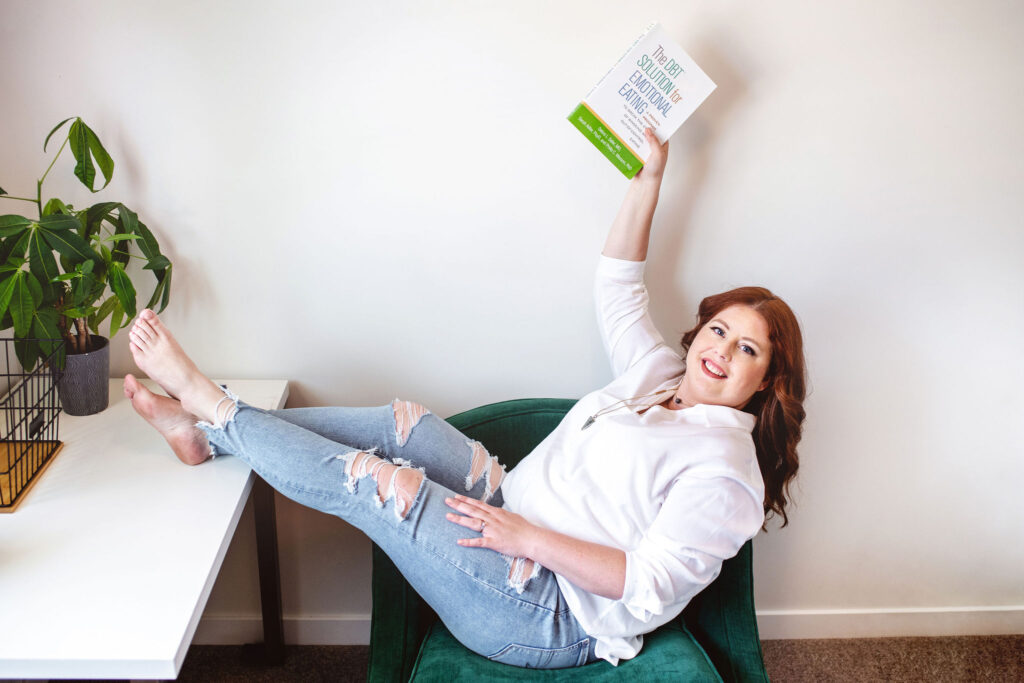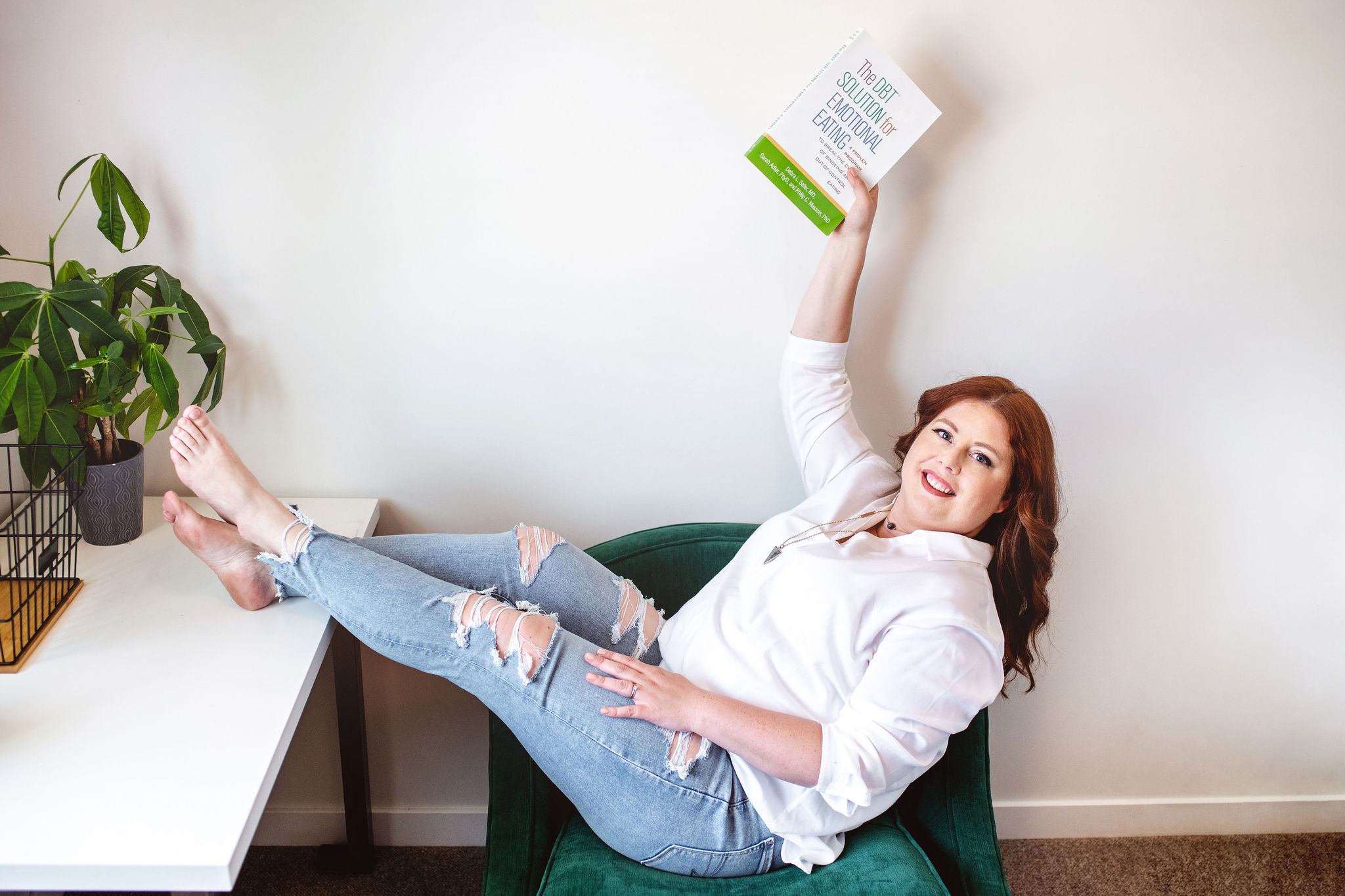It can feel so hard when stress makes us reach for food. If you are searching for how to stop stress eating, you are not alone. Stress eating often shows up when our bodies and minds feel unsafe or overwhelmed. This blog will help you understand why we turn to food when we are stressed and offer five simple, gentle tools to cope without needing to eat.
Before we jump in, hi. I’m Dr. Meredith MacKenzie, a binge eating therapist and intuitive eating coach. Inside my One Body To Love program, I help women heal their relationship with food, build gentle coping tools, and trust their bodies again. For more daily support, come join me on Instagram.

Why We Turn to Food in Stressful Moments
When you feel stressed, your body might tell you to eat. This is not about willpower. It is about safety. Food can feel like a friend. It can soothe us. When we are anxious or lonely, biting into something can feel calming. But that calm is short lived. Soon, stress returns and we may feel worse, more tired, more ashamed.
Many of us were taught that food fixes everything, sadness, boredom, tension, even joy. While food can be nourishing, using it only for stress may keep us stuck in a loop. You don’t need fixing, you need care and compassion. Showing up in this moment, that’s brave.
If stress eating feels like a pattern, this video explains why it might keep happening, and what to do next.
How to Stop Stress Eating by Using Non‑Food Coping Tools
We all need tools that help when food is not the right answer. A non‑food coping tool is something you can turn to when stress hits. These tools help you feel seen, calm, and safe. If we use them again and again, we learn that we can soothe ourselves in other ways. Food is not gone. It still can be caring and nourishing. But we can choose from other ways to cope too. Next, let’s talk about five gentle coping skills you can try when stress shows up.
Ready to reconnect with your body’s cues? Read this post on how to listen to your hunger and fullness for simple, supportive steps.
Gentle Coping Tool #1: Grounding Your Nervous System
Grounding helps your body move from feeling stuck in stress to feeling steady and safe. You can try this:
- Find a chair or sit on your bed.
- Notice your feet on the floor. Notice your body leaning into the chair.
- Take a slow breath in. Then, breathe out.
- Name what you notice: “My feet feel warm. My hands are soft. I am breathing.”
- Let your body soften as you stay with your breath.
This is not about emptying your mind. It is about gently tuning into your body. It helps your nervous system feel more calm. Grounding is small. It is not solving everything. But it helps slow down the urge to turn to food for comfort.
Gentle Coping Tool #2: Name and Validate the Emotion
Emotions are not the enemy. Pain is a signal. Saying the feeling’s name gives it space to exist. You could try:
- Pause.
- Ask yourself: “What am I feeling right now?”
- Does it feel like worry? Sadness? Tiredness? Frustration?
- After naming it, say softly: “It makes sense to feel this.”
- Add: “I may not like this, but it is okay to feel it.”
Labeling your feelings and responding with kindness can help you stop emotional eating. You might say, “I feel anxious, and that’s okay. I’m allowed to feel this.” Naming the emotion can gently shift the belief that food is the only way to feel safe.
Struggling with emotional eating? This video shares how to stop emotionally eating and take steps toward food freedom.
Gentle Coping Tool #3: Movement and Sensory Input
Sometimes our body is screaming for movement, not food. Gentle motion and sensory experiences can offer real comfort:
- Go outside and feel the breeze on your skin.
- Stretch your arms up and down slowly. Notice how each movement feels.
- Walk around your home or yard. Look for one flower, one bird, one cloud.
- Touch something soft, like a blanket or a pet.
- Listen to a song that feels comforting. Let the sound fill your chest.
Senses can give quick calm. Movement resets your body’s rhythm. It tells your brain that you are safe enough to move. Try what feels kind. You are not chasing perfection. You are choosing another way to soothe yourself.
Struggling to understand why you can’t stop eating? This post breaks down what’s really going on beneath the surface.

Gentle Coping Tool #4: How to Stop Stress Eating with Connection and Support
You do not have to do this alone. Connection is medicine for stress. You could:
- Text a friend and say: “I’m feeling tense right now. Can we talk?”
- Call someone for a few quiet minutes together.
- Share how you feel with someone you trust. You might say: “I am not sure what to do with this stress.”
- If talking feels hard, write a short note or use voice text instead.
And don’t underestimate the power of a simple hug. Science backs this up: hugging someone you love releases oxytocin, serotonin, and dopamine—the brain’s natural “feel-good” chemicals that lower stress and help you feel safe and connected. Even a brief embrace can calm your body in ways food alone can’t.
Being seen matters. When we name stress out loud, it feels less heavy. You don’t have to eat in silence when stress hits. There are people who care about you. You deserve to be heard just as you are.
Not sure what’s driving your struggles with food? Take the “What Are Your Food Struggles?” quiz to get clarity and personalized support.
Gentle Coping Tool #5: Create a Comfort Menu
Create a list of non‑food ways you can comfort yourself. You can have many items on your comfort menu. Then, when stress feels big, you can choose from it, instead of food.
Your menu might include:
- Sitting quietly and listening to breathing.
- Reading a short poem.
- Looking out a window at trees.
- Coloring quietly.
- Calling a friend or sending a voice note.
- Taking a warm shower.
- Journaling for five minutes.
- Talking to your pet or hugging your pillow.
- Putting on music that feels gentle and safe.
- Practicing mindfulness
Post this menu near where you often stress eat. Maybe on your fridge or desk. Reaching for it becomes easier than reaching for snacks when stress peaks. Over time, your nervous system will remember these gentle ways.
Ready to take your next step toward food freedom? Watch this video: 5 steps to stop binge eating starting today.
A Gentle Path Forward: How to Stop Stress Eating, One Step at a Time
Learning how to stop stress eating isn’t about getting it right every time. It’s about practicing new ways to care for yourself when stress feels heavy. You might start by grounding your body with a slow breath. Then, gently name what you’re feeling. Movement or sensory input can offer calm. Reaching out to someone you trust can remind you that you’re not alone.
Your comfort menu can help you choose something soothing when food isn’t what you truly need. And if you do eat, that’s okay too. Each time you show up with compassion instead of judgment, you’re creating change.
This work takes time, but every small, gentle choice adds up, and you deserve support as you find your way forward.
In my group program, One Body To Love, and through 1:1 coaching, I help women break free from stress eating, build compassionate coping tools, and feel more at ease in their bodies.
Not sure where to start? Book a free discovery call. Or check out the One Body To Love podcast and my YouTube channel for real, supportive conversations about food, stress, and body trust.
